What's happening?
Stay up to date
Make sure you don't miss a thing with BookTrust's news and blogs about everything to do with the children's book world.
Competitions
Win great prizes
Cross your fingers and try your luck in our competitions, giving you the chance to win book bundles and other brilliant prizes.
100 best children's books
Explore our list
Check out our list of the 100 best books for children from the last 100 years: the ultimate booklist to read before you're 14.









Add a comment